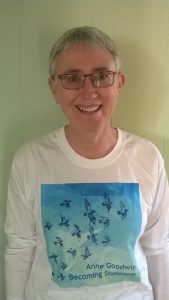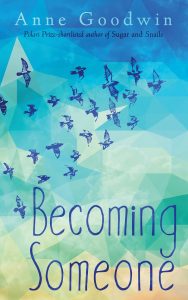What Lurks Behind Your Identity As A Writer?
 On the surface, our identity as writers is straightforward, isn’t it? A writer is someone who writes, and we write from a burning desire to express ourselves, or a sense that we’re incomplete if we don’t. When the biggest challenge most writers face is claiming a space for that passion amid myriad competing demands and responsibilities, it might seem strange to suggest we embrace our identities as writers to avoid something else.
On the surface, our identity as writers is straightforward, isn’t it? A writer is someone who writes, and we write from a burning desire to express ourselves, or a sense that we’re incomplete if we don’t. When the biggest challenge most writers face is claiming a space for that passion amid myriad competing demands and responsibilities, it might seem strange to suggest we embrace our identities as writers to avoid something else.
But in my professional life as a psychologist I was accustomed to looking underneath; now, with an anthology of short stories on the theme of identity about to be published, I’ve been applying that scrutiny to myself. Let me show you some of the things my self-concept as a writer might be masking, or have masked in the past. Perhaps some of these will also resonate for you.
As a child, my parents lived the philosophy that children were not to be heard, unless it was to echo some opinion of theirs. The fourth of five siblings, I was quick to internalise the message that I was the least interesting and least worthy of the lot. Yet I began writing stories almost as soon as could wield a pencil and, although I didn’t perceive myself as a writer, in retrospect, I must have been. Compliant creature that I was back then, my juvenile jottings could represent a tentative bid to assert myself, to give myself a voice.
My upbringing was the perfect preparation for a career in the helping professions, where caring for others can be the unconscious substitute for an absence of care for oneself. But I enjoyed my job and seemed to thrive on it, until I was hit by a mental health crisis of my own. Recovery required carving out some me-time within the working week. Despite years yearning to return to writing, I was racked with guilt at following my dream. But if writing hadn’t been an option, I might have felt even more guilty. Sitting at my desk – rather than, say, in a jacuzzi – recreates the workplace at home.
More than a decade on, I’m much less inhibited about following my own desires. But, while no longer employed and receiving a pension, I don’t like to think of myself as retired. And it’s only partly because I haven’t retired from writing, and can’t imagine I ever would. It’s also because I’m avoiding the identity of the person with empty hours to fill. As a writer, I’m busy, purposeful and focused, yet with the flexibility to escape my desk in a manner denied those constrained by the nine-to-five.
To summarise, my identity as a writer, whether acknowledged or not, has served a function beyond the pleasure of putting words on the page. As a child, it helped me develop a voice and a mind of my own in a family that discouraged independent thought. In my middle years, it diverted me from the compulsive caring that can catalyse mental collapse. Now it provides the perfect excuse to neglect the housework, as well as an interesting answer to the question, What do you do?
For others, with day jobs bounded by regulation and routine, being a writer connects them to the creativity at the heart of all human beings. For those with family commitments, it can provide permission to close the door. Even if there’s not a lot of actual writing going on, our identification as writers can be the balance that keeps us sane.
The better we’re able to unpick what’s hiding behind our identities as writers, the better equipped we’ll be to bounce back when that identity comes under threat. When the story I’ve poured my heart into is rejected, there’s a part of me that’s still a child whose voice is dismissed. When I’ve dedicated a day to a scene that’s going nowhere instead of tackling my emails, I’m the selfish health professional who’s abandoned her post. When my career seems stuck at first base, I’m just an old crone killing time.
When the woman with the dull day job can’t find her creativity, she suspects she really is a robot after all. When the woman who’s closed the door can’t block out the hubbub of family life beyond it, she doubts her ability to be a writer, and a wife and mother too.
Writers, perhaps especially women, need to grasp our identities with both hands. But beware of clutching it so tightly that, when it’s threatened, it’s liable to break!
—
Anne Goodwin’s debut novel, Sugar and Snails was shortlisted for the 2016 Polari First Book Prize. Her second novel, Underneath, was published in 2017. Her short story collection, Becoming Someone, on the theme of identity launches on Facebook on November 23rd, 2018, where the more people participate the more she’ll donate to Book Aid International. A former clinical psychologist, Anne is also a book blogger with a particular interest in fictional therapists.
Website: annegoodwin.weebly.com
Twitter @Annecdotist.
About BECOMING SOMEONE
 An administrator is forced into early retirement; a busy doctor needs a break. A girl discovers her sexuality; an older man explores a new direction for his. An estate agent seeks adventure beyond marriage; a photojournalist retreats from an overwhelming world. A woman reduces her carbon footprint; a woman embarks on a transatlantic affair. A widow refuses to let her past trauma become public property; another marks her husband’s passing in style.
An administrator is forced into early retirement; a busy doctor needs a break. A girl discovers her sexuality; an older man explores a new direction for his. An estate agent seeks adventure beyond marriage; a photojournalist retreats from an overwhelming world. A woman reduces her carbon footprint; a woman embarks on a transatlantic affair. A widow refuses to let her past trauma become public property; another marks her husband’s passing in style.
Thought-provoking, playful and poignant, these 42 short stories address identity from different angles, examining the characters’ sense of self at various points in their lives. What does it mean to be a partner, parent, child, sibling, friend? How important is work, culture, race, religion, nationality, class? Does our body, sexuality, gender or age determine who we are?
Is identity a given or can we choose the someone we become?
Category: Contemporary Women Writers, How To and Tips
























